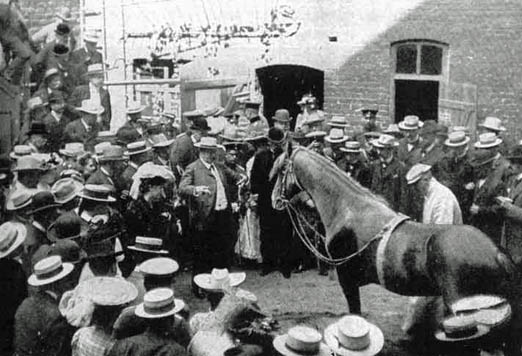
|
Horse owners can be forgiven the tendency to attribute human characteristics to horses. They are wonderfully intuitive animals with a surprising ability to retain what they perceive or learn. It often seems as if they are capable of understanding human speech, and indeed they do respond to their spoken names and to simple commands in predicable ways. After all they can hear sounds and develop conditioned responses to them.
We boarded the chestnut mare, my wife’s horse that I have spoken so much about, at a private school. They had a huge turn-out field that seemed to stretch out forever down a slope to a distant fence line. We were lucky in that my wife had permission to ride an palomino Arab crossbred mare when her owner was at work, so that we were often able to ride together despite owning only one horse. One day I went down in the field to get the chestnut, and the Arab mare rather than our horse approached me. I had the chestnut’s halter and my wife had not yet entered the field with the Arab’s halter. Turning away from the Arab mare, I said out loud to her, “Go up to the gate.” As soon as I had uttered the words, and much to my surprise, the Arab mare took off at a canter up the hill and stood by the gate, where my wife soon collected her. Yes, it did seem to me that she understood English, but I really believe that she understood that we were about to ride and of necessity would be leaving by that gate. Even so this is evidence of reasoning by an animal and of its willingness to perceive and cooperate with human intentions.

|
True speech is a human thing. It is now believed that human infants are genetically hard-wired to acquire language. It is true apes and even parrots with great effort and coaching can produce words or use sign language, sometimes even with a rudiment of grammar. However, they rarely initiate using it, make frequent mistakes and soon tire of it. They do not seem to have the innate facility for it that is exhibited by humans. Speech is so basic to our conscious experience of the world that we represent our thoughts as if they were spoken words. We assume that animals, lacking a facility to perceive and manipulate spoken words, are unable to think, to reason, or to remember.
However, this is simply not true. Animals, though lacking true speech, are quite able to think, to reason, and to remember. In addition, herd or pack animals have evolved the means to communicate with their fellows using sounds, expressions, and body language. The ability to do this is basic to their survival and carries over into their interactions with man.
I was riding my horse along a trail one day and we encountered a large black snake sunning itself in the afternoon sun. The snake went one way and my horse went the other. The very next time we were along that stretch of trail, I noticed that my horse kept looking down to his left where the snake had been. He remembered that the last time we passed that spot there was a snake and he was looking for it to be there again.

|
There are people who are practicing horse psychics and animal communicators. I have heard testimony to their often uncanny abilities to correctly discern that a particular thing is troubling a horse and once the owner corrects the stated problem that there is a noticeable improvement in the animal’s behavior. I am a skeptical person when it comes to these kinds of things. I cannot believe that horses have various concerns sometimes reported by animal psychics. For example, I do not believe that horses particularly care about what we name them or other things that are quite beyond an animal’s frame of reference. However, they may care about the tone of voice we use when we pronounce their names. I believe that animal communicators are at best extremely intuitive people, who are able to unconsciously develop a Gestalt of the animal, owner and environment and correctly develop impressions of problems within the situation. At times I suspect they are projecting their own thoughts on the animal. At worst, some may be out and out frauds. The original Clever Hans tragically disappeared into the maelstrom of the First World War but his spirit lives on today in the hearts of those who wish to believe in animal communication, involving horses processing thoughts that are framed in human words and concepts. Horses have their own unique frame of reference which is quite unlike our own. Hans' audience then is no different from the psychic's audience today. We are forever fascinated by that which is just out of reach. All that now said, if you have any doubts yourself go out and ask your horse. You just may find that he answers you.
I am still,
The Accidental Horseman
A Final Comment:
"There are more things in heaven and earth, Horatio, Than are dreamt of in your philosophy."Yes, it is good to have an open mind but I find it is necessary also to be the skeptic and to have some degree of consistency in my own view of reality. I will admit that I have experienced a few things not "dreamt of in my philosophy" but I also know that things are often not what they appear and we humans may not be the most reliable observers. We tend to see what we want to believe and are too easily persuaded by the fervent testimony of the true and all to often deluded believer. My background is in science and scientific methodology takes the frailty of the human as observer into account. I find psychics for the most part to be maddeningly vague. "There is a dark cloud over the White House." That is about as safe a predication as I have ever heard. Most natural phenomena are consistent. I have yet to drop a ball and have it fly upwards. I would like to once have a psychic consistently predict a specific result of some kind when subjected to an evaluation by a truly impartial investigator. It would be a easy enough experiment to devised and to my knowledge no one has yet successfully carried it out and then have others successfully repeat it with the same result. Until that happens the supernatural remains the supernatural. It's good popular television for the masses but not worth the time and attention of someone with more serious interests. Mention Nostradamus or Edgar Cayce to me and all I can say is "Bah! Humbug! Humbug, I say!!"
From: Hamlet by William Shakespeare: Act 1. Scene V